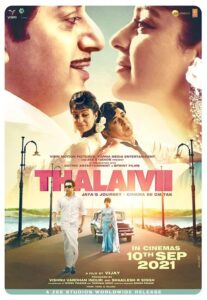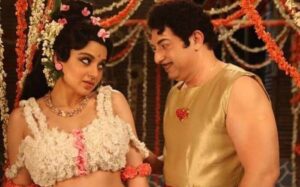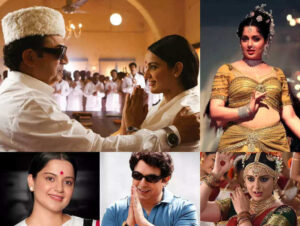Thalaivi Movie Review | Kangana Ranaut’s performance in a Jayalalithaa’s biography

Cast: Kangana Ranaut, Arvind Swami, Nassar, Bhagyashree, Samuthikarani, Raj Arjun, Jisshu Sengupta
Director: AL Vijay
Rating: 2 stars (out of 5)
Thalaivi tangles itself up in knots trying to piece together the life and times of six-time Tamil Nadu chief minister Jayalalithaa and tell a narrative. It hurtles recklessly and vainly about the room, looking for a plank that can support its weight.
In essence, the Jayalalithaa biography is that of a strong-willed, indomitable woman who ascended to power in a mostly male-dominated culture and then reigned unchecked over a party and a state for a long time. The drama of Jayalalithaa’s career as an actress, activist, and politician is reduced to drab driblets of information – much of which has been in the public domain for decades – and a succession of artificial scenes designed to portray Kangana Ranaut in the best light possible.
Thalaivi is, without a doubt, a Kangana Ranaut movie. In the first part of the film, she plays a bubbly, squeaky wanting to be movie star infatuated by the dynamic MGR which is portrayed by Arvind Swami in which he is a rare bright grace in a dull affair. The film transforms the iconic matinee idol-turned-political supreme personality to MJR. Much to the displeasure of R.M. Veerappan(Raj Arjun) who is MGR’s chief image manager, film producer, and 24-hour companion, she does not hide her emotions for him.

Not really that Jayalalithaa’s mentor and co-star, doesn’t share her loving feelings. However, the picture is unable to overcome a self-inflicted stumbling block. The love narrative is supposed to be the film’s core, however the expression of romantic zeal is done in a chaste, squeaky-clean manner. Our culture is steeped in reverence for our leaders, whether they are alive or dead. Thalaivi admires the atmosphere of purity that surrounds the two most powerful politicians in Tamil Nadu. As a result, the portrayal of a renowned relationship is sanitised, stuffy, and restricted.

Ranaut transforms into the aggressive “propaganda secretary” of MGR’s party in the second half of Thalaivi, which is dedicated to the heroine’s transformation, on her road to becoming the state chief minister. The actress takes the role of a loud, bombastic gender-affirming campaigner who sets tongues rolling in a political party ruled by men who never stop trying to trim Jaya down to size in this film.
Thalaivi was directed by a man, A.L. Vijay, and written by men as well (K.V. Vijayendra Prasad and Rajat Arora). The film does a far better job of examining the dynamics between MGR and his ally-turned-foe Karunanidhi (Nassar, who deserved far more screen time for the power of his presence as well as the worth that the character adds to the filmic account of a critical phase) than it does about focusing on Jayalalithaa’s trials and tribulations.
Kangana Ranaut plays a woman who, over the course of her eventful career, demolished gender barriers to hold her ground long enough to take the reins of a state government and become an unquestioned leader of her people. Ranaut is a self-proclaimed rebel in real life against a male-driven star industry.
Kangana Ranaut may be a good fit for the character, but she ruins it by imitating Akshay Kumar-like stride more toward the camera to end a money scene or crown a punchline. She performs this several times during the film, accompanied by ear-splitting, high-pitched music that is supposed to represent triumph and closure. You must first eliminate the means and methods of machismo-fuelled films if you want to raise the banner of revolution against Bollywood’s gender disparity. Thalaivi isn’t like that at all.
In actual life, once she emerged from MGR’s shadow, Jayalalithaa set her own political rules, ensuring that all the men in her party would pledge allegiance to her for the rest of her life, in a full reversal of the gender discrimination she had experienced.

The Thalaivi script’s woman-against-patriarchy subject is important, but it suffers from a lack of consistency as well. Jayalalithaa is verbally assaulted and mistreated by governing party MLAs in the state Assembly in the film’s opening scenes. She compares her humiliation to the cruel Kauravas’ disrobing of Draupadi, and swears to return to the House only when she has political power.
As she rises through the ranks of the film industry, Jayalalithaa is completely reliant on MGR. After the intermission also, the heroine does a dance in which she ‘grovels’ musically before the chief minister. She is so devoted to the man that she wishes to have him all to herself. In an earlier scene, MGR tells Jaya that “Bhagwan kisi ek ka nahi ho sakta.”
Several of the performances are excellent. Arvind Swami, in particular, does a fantastic job impersonating MGR. Raj Arjun creates a credible figure in the role of the man who can’t abide Jayalalithaa’s proximity to his leader. Poorna (as Jaya’s aide Sasikala), Madhoo (as MGR’s wife), Bhagyashree (as Jaya’s mother) are all lost.
Thalaivi stumbles because the writing is all over the place, especially when the spotlight isn’t on the main character and it’s clearly begging to return to its focal point. Kangana Ranaut is as sincere as ever as a new recruit about to go to war, but the film’s length and leaden-footed storyline let it down. The rambling plot fails to provide insights into Jayalalithaa’s mindset that would allow the viewer to genuinely know her. As a result, we walk out of the room with no idea what happened.

